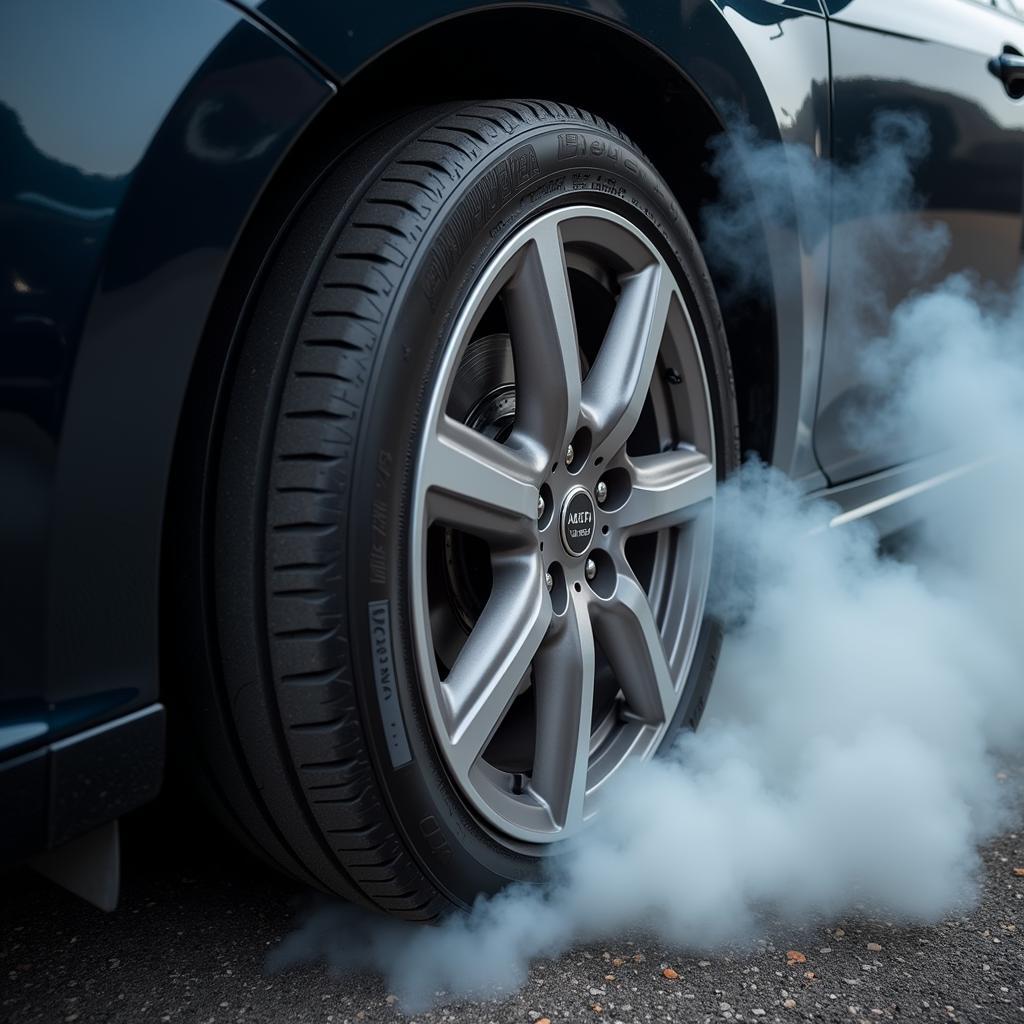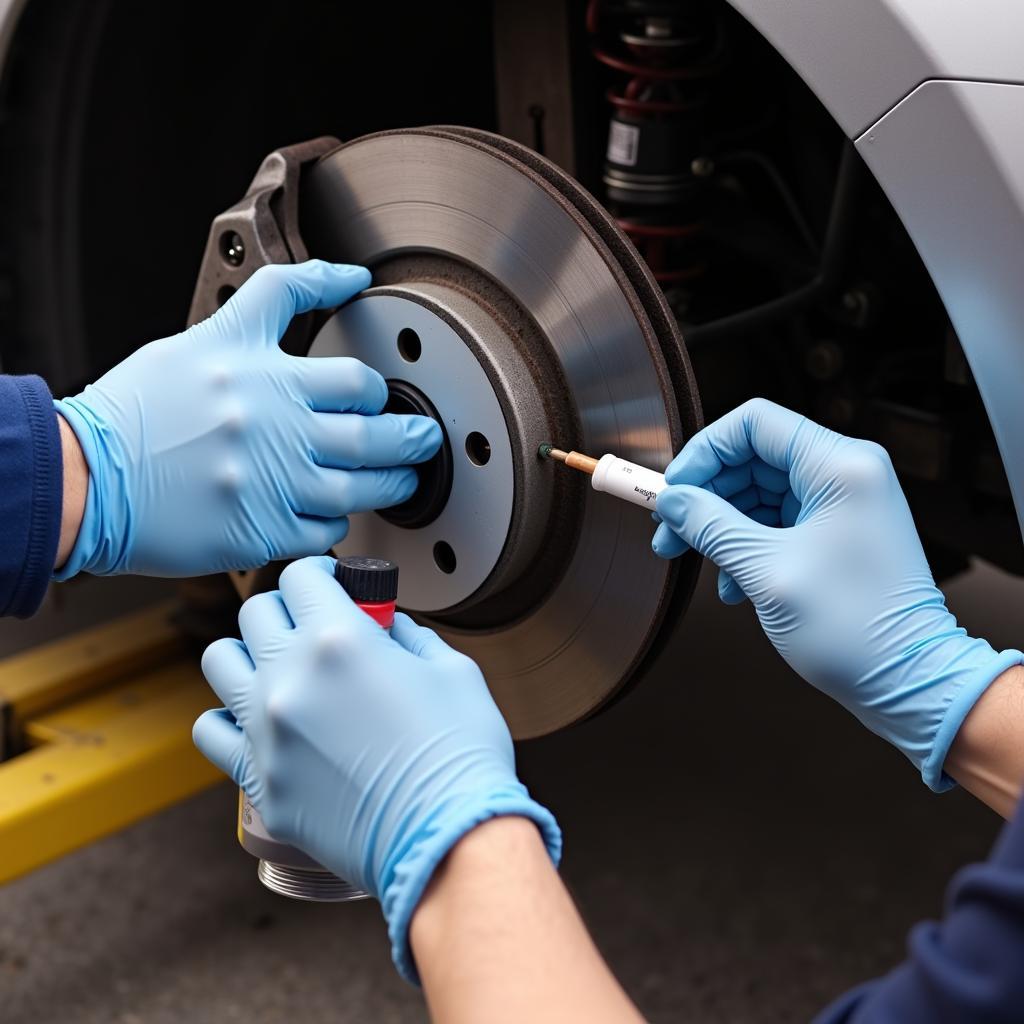Hearing a high-pitched squeal or screech every time you hit the brakes can be unnerving. While not always a sign of a major issue, squeaky brakes are definitely telling you something needs attention. This comprehensive guide will walk you through the common causes of squeaky brakes and provide DIY solutions to help you get back to quiet, safe driving.
 Car with Squeaky Brakes
Car with Squeaky Brakes
What Causes Brakes to Squeak?
Several factors can cause your brakes to make noise. Let’s explore some of the most common culprits:
1. Worn Brake Pads:
This is the most frequent reason for squeaky brakes. Most modern brake pads are equipped with a small metal indicator that scrapes against the rotor when the pad material wears thin. This scraping creates the high-pitched squealing sound as a warning to replace your pads.
2. Glazed Brake Pads:
Excessive heat from heavy braking can cause the brake pad material to crystallize and harden, creating a slick surface known as glazing. Glazed pads don’t grip the rotor effectively and often result in a squeaking noise.
3. Dirty or Rusted Rotors:
Dirt, debris, and rust build-up on the brake rotors can interfere with the contact between the pad and rotor, leading to squeaking.
4. Lack of Lubrication:
The caliper pins and other moving parts in your brake system require lubrication to function smoothly. When these parts become dry or dirty, they can create friction and noise.
5. Environmental Factors:
Moisture, humidity, and extreme temperature changes can all contribute to temporary brake noise, especially after the car has been parked for a while.
Troubleshooting Squeaky Brakes: A DIY Approach
Before you assume the worst, there are several things you can check and fix yourself:
1. Inspect Your Brake Pads:
The first step is to visually inspect your brake pads. If you see less than ¼ inch of pad material remaining, it’s time for a replacement.
2. Clean Your Rotors:
Use a brake cleaning spray and a wire brush to remove dirt, debris, and rust from the rotor surface. This can improve pad-to-rotor contact and reduce noise.
3. Lubricate Caliper Pins:
With the proper tools, you can remove, clean, and lubricate the caliper pins with high-temperature brake grease. This ensures smooth caliper operation and reduces friction.
4. Break-In Procedure for New Pads:
If you’ve recently installed new brake pads, ensure you followed the proper break-in procedure outlined by the manufacturer. This process helps mate the pads to the rotors evenly and prevents glazing.
 Lubricating Brake Caliper Pins
Lubricating Brake Caliper Pins
When to Seek Professional Help
While some squeaky brake issues can be resolved with DIY solutions, others require the expertise of a qualified mechanic. Consider seeking professional help if:
- You’re uncomfortable working on your car’s brake system.
- The squeaking persists even after trying the DIY solutions.
- You notice other symptoms alongside the squeaking, such as vibrations, pulling, or a soft brake pedal.
“Ignoring squeaky brakes can lead to more serious and expensive problems down the line,” says John Smith, Senior Mechanic at Autotippro. “It’s always best to err on the side of caution and have your brakes checked by a professional if you have any concerns.”
Fixing Squeaky Brakes on Your Car: Conclusion
Squeaky brakes are a common car problem that can often be solved with some basic maintenance. By understanding the potential causes and following the DIY solutions outlined in this guide, you can get back to enjoying quiet, confident braking. However, always remember that your brakes are critical for your safety, so don’t hesitate to seek professional help if needed. For expert advice and assistance with your car’s braking system, contact the trusted professionals at AutoTipPro at +1 (641) 206-8880 or visit our office located at 500 N St Mary’s St, San Antonio, TX 78205, United States.
FAQs
1. Can rain cause squeaky brakes?
Yes, moisture and humidity can cause a thin layer of rust to form on the rotors, leading to squeaking, especially after the car has been parked overnight.
2. How often should I replace my brake pads?
Brake pad lifespan varies depending on driving habits and conditions. Generally, it’s recommended to have them inspected every 12,000 miles and replaced when they reach the wear indicator mark.
3. Is it safe to drive with squeaky brakes?
While some squeaking can be harmless, it’s crucial to determine the cause. If you’re unsure, it’s best to get your brakes checked by a professional to ensure your safety.
4. Can I just spray WD-40 on my brakes to stop the squeaking?
WD-40 is not a suitable lubricant for brake components. It’s essential to use high-temperature brake grease specifically designed for this purpose.
5. How much does it cost to fix squeaky brakes?
The cost depends on the underlying cause and whether you need new brake pads, rotors, or other components replaced.





Leave a Reply